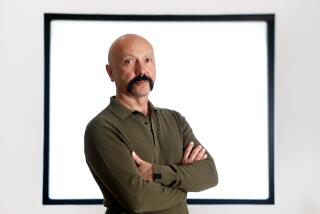Undecided voters lean from Romney toward Obama
WASHINGTON — For Mitt Romney, making a comeback in the race for president will require changing the minds of voters like Barry Hubscher, Cathleen Kimmel and Michael Gray.
All three had considered voting for the Republican nominee as recently as August, but lately they have found themselves leaning toward President Obama. Listening to them and others like them helps explain the shift in polls toward Obama since the Democratic convention and illustrates the magnitude of the task that lies before Romney as he tries to catch up in an increasingly challenging race.
In an effort to explore the sentiments behind the poll numbers as Romney approaches the first of three presidential debates, Los Angeles Times reporters over the last week interviewed four dozen voters who in mid-August had told pollsters for The Times and USC’s Annenberg School for Communication and Journalism that they were undecided or only weakly committed to their candidates.
POLITICAL CARTOONS: Horsey’s Top of the Ticket
Asked an open-ended question about what news regarding Romney or Obama had stuck in their minds over the last couple of weeks, 1 in 3 spontaneously mentioned Romney’s videotaped remarks about the 47% of Americans who do not pay income tax — the only incident to be so widely recalled.
In Wheat Ridge, Colo., a western suburb of Denver, R.J. Montoya, 31, who admires Ron Paul and deeply dislikes Obama, might have seemed a natural Romney voter. He hasn’t closely followed the campaign, having just started a new job in healthcare, but he had heard about Romney’s remarks. “They bother me,” he said.
“I’m not exactly sure which way I’ll go,” he said, raising the possibility of voting for a third-party candidate. Romney’s remarks were “one thing I could see having an impact on how I see this election.”
Many voters, like Montoya, perceived Romney’s remarks as an unguarded moment of truth, a peek behind the veil of the campaign. But the problem the GOP nominee faces goes deeper, the interviews made clear: His remarks have stuck with voters in part because many had already found his message wanting.
Hubscher, who manages a dining club in one of Chicago’s western suburbs, is one such voter.
Over the last year, he has been listening for a compelling reason to back Romney. In the poll, he said he leaned toward the challenger. Indeed, Hubscher epitomizes the profile of a voter Romney should have been able to count on: a suburban, white, 50-year-old man who manages a business, thinks of himself as a Republican and has been disappointed with Obama after voting for him in 2008.
And yet, a little more than five weeks before the election, he now leans toward giving the president another term. “I kind of feel like he hasn’t fulfilled the promises he set out, so maybe we should look in a different direction,” he said. “But I’m not really feeling the Republicans have put forth a candidate to replace him.”
“I just don’t think Romney has made his case,” he said, citing a lack of specifics in Romney’s campaign pledges.
Hubscher watched the Republican convention and was deeply impressed by Sen. Marco Rubio of Florida. “I felt a connection to the things he was talking about,” he said. By contrast, Romney, who spoke later the same night, made little impression. His campaign, Hubscher said, boils down to, “‘Look what a bad job Obama’s done, and I’m not that guy.’ That’s not good enough.”
Even among Romney backers, that sense of disappointment came up frequently. When asked what they remembered of the two party conventions, only one of the four dozen interviewed brought up Romney’s speech.
Some clearly do embrace his core message. “The economy is a business. What makes it work is thinking like a businessman,” said James Johnson, 43, who does security work for a manufacturing firm in Tulsa, Okla.
But most who said they would vote for Romney couched their choice as opposition to the incumbent.
“I will vote for Romney, but I’m voting against Obama. I wish we had a better representative,” said John L. Nelson, 78, a retired department head of an electrical transformer plant near St. Louis.
“In politics it’s very useful to be articulate, to be able to make your case. This is the thing Reagan did,” Nelson said. “Romney does not have the skill.”
During the Republican primaries, Romney stressed his conservatism. In recent days he has tried to moderate his image, talking about the universal healthcare law he championed as governor of Massachusetts and airing advertisements that emphasize his concern for the poor.
But the party’s conservative stands have clearly worked against him with some voters. Kimmel, for example, a 49-year-old independent who lives near Lansing, Mich., had considered supporting Romney for much of the year, in part because of the arguments made by her husband, a small-business owner who fears the impact of Obama’s healthcare and economic policies.
“We make more than $250,000 a year, and so he’s going to get creamed on the taxes,” she said.
“I had been leaning Republican,” she said, but then she began to hear more about the party’s positions on gay rights and abortion, a topic the Obama campaign has hammered home with suburban women voters in swing states. She fears Republicans would seek to restrict abortion even in cases when a woman’s life is endangered — a position Romney does not advocate.
“I was disappointed,” she said, “like, so disappointed that I was ready to vote for the Democrats instead.”
Her husband keeps urging her to vote for Romney, she added, “but I can’t tell him that I’m going to do that because of the stances on other things.”
Gray, 28, a restaurant manager in Indianapolis, cast his first presidential vote for George W. Bush in 2004. Undecided earlier this summer, he now shares some of Kimmel’s concerns, mentioning the move by some Republicans to use the term “forcible rape” to limit when abortions should be allowed in cases of sexual assault.
“It may not sound like much, but that’s really detrimental against women’s rights,” he said. “Rape is rape. You don’t need the word ‘forcible’ added to it.”
Republicans “have just kind of doubled down on crazy lately,” Gray said.
But it was Romney’s videotaped remark about the 47%, which was made before an audience of major donors at a fundraiser, that “really stuck with me,” he said.
“He really showed who he truly was by speaking in private to those guys. He really just came off as not caring and as ignorant,” Gray said. “He doesn’t know what true middle-class income is. And that’s because he doesn’t know anything outside his own privileged life to know what the average American makes or does for a living.”
Even for some of Romney’s backers, the 47% remark has become a subject of exasperation.
“It’s not going to change my opinion, but it wasn’t very smart,” said Kara Zavala, a 33-year-old resident of Oklahoma and a Romney backer. “I think it was a turning point for a lot of voters who were undecided.”
POLITICAL CARTOONS: Horsey’s Top of the Ticket
Robin Abcarian, Mark Z. Barabak, Hector Becerra, Michael Finnegan, Kim Geiger, Mitchell Landsberg, James Rainey, Alana Semuels and Paul West contributed to this report.
More to Read
Get the L.A. Times Politics newsletter
Deeply reported insights into legislation, politics and policy from Sacramento, Washington and beyond. In your inbox three times per week.
You may occasionally receive promotional content from the Los Angeles Times.







